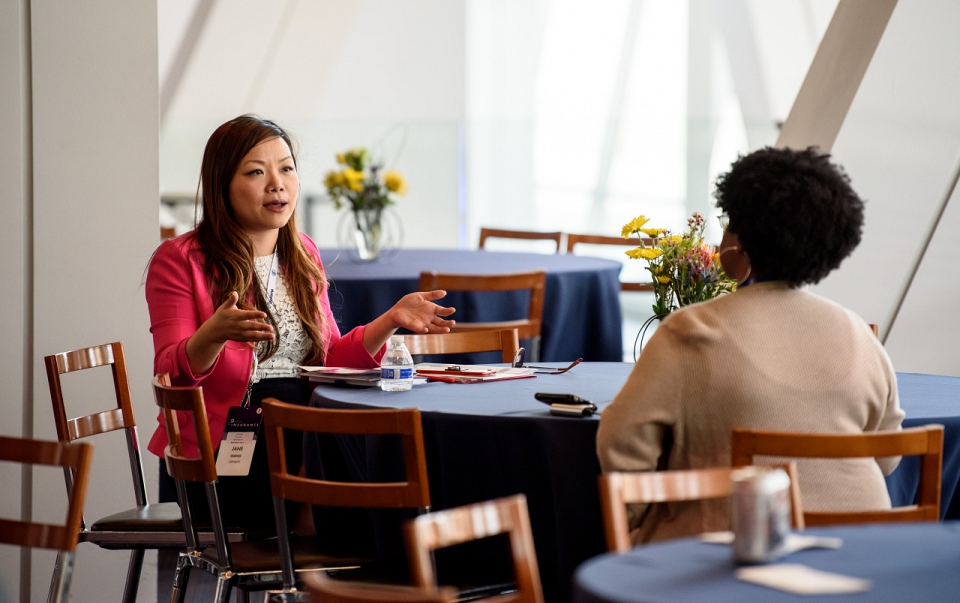A bit of a backlash is developing about the insurtech movement – sort of, "We've been hearing about insurtech for a few years now, so why hasn't it meant the end of life as we know it? Why doesn't an app on my phone just know what I want and when I want it and provide that insurance for me?"
We understand. We get impatient, too. But innovation in insurance is actually moving into an exciting and healthy new phase, where insurtechs and incumbents are finally working together rather than circling each other warily as potential enemies.
We've always thought that cooperation was the way to go. That's why our team at gener8tor structured our OnRamp Insurance Conference to facilitate authentic, high-yield connections between participants at all levels. Over 1,100 insurtechs and incumbents come together for a one-day conference at a sports stadium. The program includes industry thought leadership, product demos, startup pitches, exhibitions and networking optimized to help attendees uncover opportunities to work with, not against, each other. We wanted to create an onramp, if you will, for consequential deals.
As we draw closer to our fourth insurance conference (in Minneapolis-St. Paul on April 11 -- you can
register here), the sort of deal that grew out of last year's event could serve as a model for how incumbents and insurtechs can collaborate.
TCARE joined us last year as a startup with a grand total of two employees but with an unusual insight into long-term care: that caring for the caregivers can be key.
"There are a lot of solutions out there helping the family members manage care better. We do not do that," said Ali Ahmadi, CEO and cofounder of TCARE. "We are all about the care of the family caregiver, not the patient. We take care of the family member better, which in turn has shown significant outcomes on the patient side."
Science known as identity discrepancy theory shows that sons and daughters go through five stages as they shift from primarily a child-parent relationship to a caregiver-patient relationship, and TCARE monitors the transitions so it can support the children/caregivers during each phase. A two-year pilot with the state of Washington found that the TCARE approach delayed patients' move into long-term care by 21 months, while reducing costs by 20% by allowing so much more aging in place.
See also: So, You Want to Work With Insurtechs?
At OnRamp last year, TCARE had a series of meetings with insurers that, over the following six months, developed into formal relationships, including investments. One is from RGA, the other from a faith-based institution that doesn't yet want to be identified.
Ahmadi says the RGA relationship has provided considerable expertise in modeling that has improved TCARE's underwriting and has contributed demographic data on families that has greatly increased TCARE's accuracy.
TCARE is now at 19 employees, on its way soon to 30-plus. It has signed a long-term contract with the state of Washington for its Medicare/Medicaid programs and has seen business pour in from other states and insurers looking to manage their long-term-care businesses. TCARE is now mandated legislatively in four states for use in their Medicare/Medicaid programs.
Everybody wins, including the children and the parents they're caring for.
At OnRamp this year, we expect a great deal of interest on the medical and healthcare side of the business, partly because there is so much data that can be used in insurance applications (while protecting everyone's privacy). As usual, we also believe that what we think of as horizontal technologies will play a major role, both at the OnRamp conference and within the industry – it isn't just insurtechs proper that will drive innovation; companies with cross-industry expertise in analytics, AI, etc. will be crucial, too.
Elizabeth Carraro, director of digital strategy and partnerships at Securian, says, "We're looking at the innovation space broadly, not just looking at the latest and greatest in life insurance. How do you take the sorts of ideas you see with the connected home and apply that kind of thinking to improve life insurance? How do you bring a 140-year-old company into modern times?"
Securian, which provides life insurance and other investment and retirement solutions, is looking in three main areas, she says. The first relates to changes in distribution, including through new aggregators and direct-to-consumer applications. "How do we change the conversation," she asks, "so we aren't just providing a piece of paper? Are there planning tools we can provide, as well?" The second covers the customer experience, a huge emphasis in the life insurance industry. "If you provide data to show that you're taking care of your health, how can we provide you with a better experience and maybe a better rate?" Carraro asks. The third relates to back-end operations: "If you started a company from scratch, what would your systems look like? You need to build for today's tech stack."
Brittany Clements of Allianz Life Ventures says the corporate VC fund has a double mandate. As you'd expect, the fund needs to generate a significant return on its investments. But it also helps the startups in the portfolio thrive and assists the rest of Allianz in taking advantage of the innovative capabilities.
"It's more about the strategic opportunities," Clements said. "We have one person devoted fully to business development for these investments. We work together to solve some of our business challenges, as well."
She cites Covr Financial Technologies, which Allianz Life Ventures met at OnRamp and invested in last year. Covr has developed a platform that digitizes the whole life insurance process for advisers, which is a business in its own right but also can help Allianz's existing operations.
See also: Is Insurtech Wave Hitting a Riptide?
Rick Zullo, who cofounded Equal Ventures and who has a history both with insurance investing and with OnRamp, focuses on establishing relationships at conferences, often well before he considers an investment. He met RiskMatch at our first OnRamp insurance conference and developed relationships that led, first, to an investment and a seat on the board and then to a successful exit when Vertafore bought the analytics company in 2017.
"Our general philosophy has been less about disruption and more about appreciating what legacy insurers and brokers can do very well and appreciating what startups do well," Zullo says. "We try to match those capabilities."
He adds: "Insurance is a world that is rooted in connections and complexity. The folks who win require both. You have to have an extremely nuanced understanding of how this industry operates, and of how relationships are extremely important to getting things done."
We agree, which is why we think the partnership approach for insurtechs and innovation will prove to be so fruitful.
We hope to see you at the Target Center in Minneapolis-St. Paul on April 11. Last year's crop of startups that applied for one-on-one meetings have raised more than $1.7 billion in financing, and we think this year's group is at least as intriguing. Please register here and join us.

